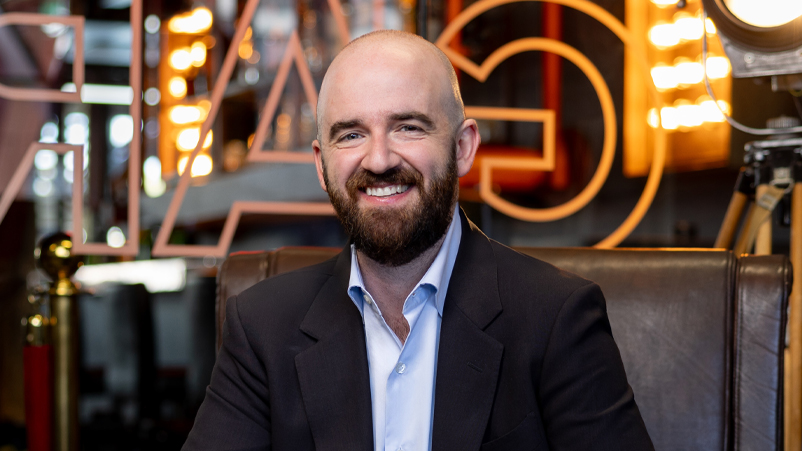CEOs, CFOs at Burger King, Colgate-Palmolive, LVMH, Mondelez, Nestlé buck recession narrative, spend more on ads, tell investors marketing driving growth

CEOs and CFOs from Burger King, Nestlé, Colgate-Palmolive and more are telling Wall St that marketing is moving the needle. Pic: Generated with AI (hence the pork knuckles).
Corporate big bosses are backing their marketers in recent investor earnings calls, hammering home a clear message that marketing works and is driving growth. While tech has pulled back, the major FMCG's are ramping up spend – with CEOs and CFOs at the likes of Beiersdorf, Burger King, Kellogg’s, LVMH, Colgate-Palmolive and Nestlé collectively sanctioning billions more dollars in marketing investment and reversing pre-pandemic ad budget cuts. Brian Wieser, former WPP global head of business intelligence turned principal at Madison and Wall, says that should come as no surprise, despite wonky economic forecasts. He's been compiling CEO/CFO statements on marketing to investors – and the indications are that there's more upside to come.
What you need to know:
- CEOs and CFOs at some of the world’s largest FMCG/CPG companies have been banging the drum for marketing to investors – telling them that investing more equals higher growth.
- It’s a solid counter-narrative to forecasts of major cuts and advertising pullbacks, tech aside, per Brian Wieser, former GroupM global business intelligence chief turned founder of consultancy Madison and Wall.
- It’s also a counter-narrative to suggestions that marketing is undervalued by top corporate honchos (though CPG bosses tend to be a savvier breed, if not in the weeds, when it comes to marketing).
- Wieser’s compiled a verbatim set of pro-marketing quotes from top bosses to investors underlining why they have let loose the marketing purse strings this year – and why many plan to do so into 2024: Funnily enough, reminding as many people as possible to buy your product actually works.
- The likes of LVMH increased marketing spend 24 per cent in H2 2023, and watched revenues climb 15 per cent. Luxury ROI.
- Burger King, Nestlé, Colgate-Palmolive, Capital One, Beiersdorf and other ad whales plan to go larger, per the people controlling that spend.
- Question both market forecasts and economists, says Wieser. In fact, CMOs should question everything.
Advertising will be up on both the dollar and a per cent to sales basis. Funding … advertising continues to accelerate the top line growth of the company.
Yes bosses
CEOs and CFOs at some of the world’s biggest brands have bucked the prevailing narrative of belt tightening and marketing budget cuts. The likes of Beiersdorf, Kellogg’s, LVMH, Colgate-Palmolive and Nestlé spent more this year – billions more. They have no plans to pull back heading into 2024, because it’s driving major growth – 15 per cent for LVMH – despite pressure on consumer spending across global markets.
Brian Wieser, GroupM’s former global head of business intelligence turned principal at Madison and Wall, said that should come as no surprise to those studying business fundamentals. Yet the banks and economists predicting major budget squeezes have largely called it wrong, he suggested.
“The models they were using seemed to ignore the weirdness of the pandemic … namely all the extra savings,” Wieser told Mi3. Plus, while consumers and businesses globally are struggling with impacts of rate hikes and inflationary pressure, “inflation is positive for advertising, provided you have underlying economic growth, which we do”.
Wieser thinks while tech firms have retreated, the broader marketing-advertising picture is close to business as usual.
“In a normal ad market, if you divided the world up into ten categories, we would have six or seven that are spending and growing, three or four that are middling [holding] and one or two that are cutting.” That is current case, he said.
Tech firms are cutting hard, “because of their unrealistic expectations of growth,” per Wieser, putting pressure on those over-reliant on their marketing spend, with Sir Martin Sorrell’s S4 Capital the latest ad holding company to feel the pinch. “But [category-wise] everyone else is mostly stable or increasing.”
In a research note, Wieser said S4’s pain should come as no surprise, given technology clients make up 46 per cent of the group’s revenue. Based on full year 2022 data, that contrasts to tech and telecom revenues accounting for 13 per cent of global revenues at Publicis, 14 per cent at Omnicom, 15 per cent at Interpublic and 26 per cent at WPP (though WPP’s figure also includes media clients). But he pointed out that there is the potential for an “outsized rebound” should tech return to bullish intent.
CEO/CFOs bulls
In the meantime, statements from CEOs and CFOs at major CPG/FMCG, fast food and financial services firms, which Wieser has been compiling from recent earnings calls, suggest many of advertising’s old guard will maintain increased levels of spend, with some ramping up further:
- “(Burger King US has) more and more advertising dollars that we're going to be prepared to spend,” said Restaurant Brands International CEO, Joshua Kobza.
- “Each of our (W.K. Kellogg) regions has planned to improve margins … while still incorporating rising investment in our brands with advertising and promotion rising faster than net sales growth,” per Kellogg’s CFO Amit Banati.
- “In the first half of 2023, our advertising and marketing spend increased by 7.5 per cent in constant currency versus the same period of the prior year. As a percentage of sales, it was 7.1 per cent, representing a 50 basis points increase over the second half of 2022. In the second half of 2023, we expect to further increase our marketing investments,” said Nestlé CFO, François-Xavier Roger.
Speaking separately at a Barclay’s-hosted investor conference, Roger indicated Nestlé will increase marketing spend for the foreseeable: “We will continue to increase our marketing investment further than the second half of this year. We expect to go back to where we were a few years back, which means that we will need to ramp up even further the investments in 2024 as well.”
Outside of CPG, luxury goods giant LVMH is also reaping rewards of boosting ad budgets.
“What we’ve seen over the last three, four years is, roughly speaking, an increase of… 1 per cent of sales in terms of advertising and promotion. I think we moved roughly speaking from 11 to 12 [per cent of revenue spent on advertising and promotion], something like that. We have benefited from significant operating leverage on selling expenses. So basically we have reinvested into advertising and promotion, what we've been saving on selling expenses,” per LVMH CFO Jean-Jacques Guiony. (The firm reported a 24 per cent increase in ad spend for the first half of 2023, and 15 per cent revenue growth across the group YoY).
Mondelez CFO Luca Zaramella indicated there may be a bit more in the kitty: “We can push a little bit harder on advertising investments. And so we want to support our brands. We are not going to invest [crazy volume] in promotions. We prefer investing in advertising.”
Colgate-Palmolive’s CEO Noel Wallace said the firm will end the year with net increased spend: “We'll continue to invest in building brand health and market shares and executing our pricing strategies and volume for the balance of the year. So advertising will be up on both the dollar and a per cent to sales basis,” per Wallace. “Funding … advertising continues to accelerate the top line growth of the company.”
Beiersdorf CFO, Astrid Hermann: “We increased efficiencies within the marketing budget and can report significant increases in absolute and relative terms in working media, specifically in digital spending.”
Outside of FMCG/CPG, other bosses are also backing marketing to the hilt, including Capital One CEO, Richard Fairbank.
“Why we're investing heavily in marketing… first of all, we just see attractive growth opportunities across our business, particularly in the card business. We've continued to expand our products and our marketing channels. We're seeing very good traction,” Fairbank told investors.
Just question everything.
Outliers, watch-outs
Versus other verticals, Wieser said CPG management tends to better understand marketing’s value as a growth driver.
“There’s a couple of reasons why they are talking about [marketing more to investors]," he told Mi3. "The main one is that for packaged goods companies, it is so important to their growth. And we're also in a phase where there's a bit of a reversal from where we were a pre-pandemic, where there was this trend towards cutting costs pretty aggressively – at least on advertising. So I think because much of the buy-side and the sell-side think advertising is helpful to these companies in particular, it’s a thing they pay attention to.”
While the CEOs and CFOs may not be deep in the weeds of marketing, “they definitely have to spend time understanding what they are doing [marketing-wise],” said Wieser.
“Packaged goods companies spend five to 10 per cent of their total revenues on advertising, on media – and in some cases are spending 20, 30, 40 per cent on marketing, and it’s the single most important driver of their business other than manufacturing.”
Which suggests an increasingly important CMO remit, especially in CPG.
For marketers more broadly over the remainder of this year and into next, what should be top of mind?
“Question everything about why they do what they do – and what informs why they're doing what they're doing,” per Wieser. “Just question everything.”


